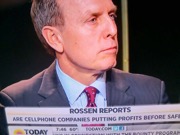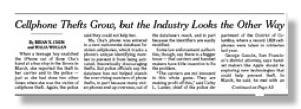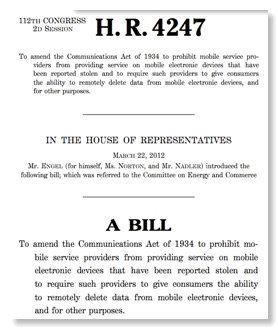NBC's Today on Stolen Smart Phones - Again
Visit NBCNews.com for breaking news, world news, and news about the economy
As the cellular industry starts the 3rd and last day of CTIA 2013™ in Las Vegas accompanied by all 3 remaining FCC commissioners - who came despite the sequester although no other FCC staff came, the NBC Today show risked joining the City and County of San Francisco on the CTIA boycott list. In the segment shown above, for the second time in a little over 2 months a Today segment by Jeff Rossen highlighted violent thefts of smart phones.
This is another unintended consequence of today’s ubiquitous cell phone use. All new technologies have unintended consequences. While the cell phone industry strives to make positive contributions to our society, economy, and environment it consistently turns a near blind eye to such unintended consequences preferring “solutions” that have little or no impact on industry operations regardless of whether they actually impact the problem at hand. While I can understand a little this tendency of industry, I really don’t understand why FCC tolerates it consistently. Perhaps the new leadership will take a new look?
One real problem that prevents reliable “bricking” of stolen phones is the fact that the IMEI or “serial number” can be changed in many models. As was discussed here earlier, some privacy advocates may favor this, but consumers are ignorant of this design detail that may threaten their life. Making all smart phones reliably “brickable” would enhance public safety. Why doesn’t the cellular industry insist to its suppliers that it be done? If some people really want phones with changeable serial numbers, they should be clearly labeled as such if allowed on the market.
Below is a YouTube “film festival” of violent cell phone thefts so you can see what we are talking about. If you need more, YouTube has plenty!
(This one below is from Brussels, not US)
NY Times: "Cellphone Thefts Grow, but the Industry Looks the Other Way"
The cellular industry does may things very well. It provides high speed reliable service in many parts of our country. It provides amber alert service to help protect children. It helps those suffering from spousal abuse get cell phones for their protection. But the industry also turns a blind eye to the societal problems that are the unintentional consequences of its service. Last year’s New Year’s Resolution post compiled several of these issues. None have shown noticeable improvement.
As in many things, problems not attended to often get worse. The item at the top is an article from the front page of the May 2 New York Times with the title “Cellphone Thefts Grow, but the Industry Looks the Other Way”. One wonders if CTIA and its members will now boycott advertising in theTimes as they have boycotted San Francisco?
The article starts:
When a teenage boy snatched the iPhone out of Rose Cha’s hand at a bus stop in the Bronx in March, she reported the theft to her carrier and to the police — just as she had done two other times when she was the victim of cellphone theft. Again, the police said they could not help her.
Commenting on a record 1,829 cellphones were taken in robberies last year in Washington DC, Police Chief Cathy L. Lanier was quoted as saying, “The carriers are not innocent in this whole game. They are making profit off this.” We guess she was not very moved by CTIA’s John Walls, Vice President, Public Affairs who made this YouTube video last year to show how concerned the industry was about this issue after CTIA felt the Today Show misrepresented their position:
March 2012 Today Show segment on cell phone thefts:
Visit NBCNews.com for breaking news, world news, and news about the economy
CTIA response to Today segment the same day:
While CTIA statements on cellphone theft usually focus on protecting private information on the phone, the large number of thefts raises concerns about violence and contribution to growing crime rates. According to the Times,
In San Francisco last year, nearly half of all robberies involved a cellphone, up from 36 percent the year before; in Washington, cellphones were taken in 42 percent of robberies, a record. In New York, theft of iPhones and iPads last year accounted for 14 percent of all crimes.
Some compare the epidemic of phone theft to car theft, which was a rampant problem more than a decade ago until auto manufacturers improved antitheft technology.
The Times article point out that one complexity that limits owner from making stolen phones nonfunctional by remote controls that the International Mobile Station Equipment Identity of many phones can be hacked, making the stolen phone impossible to identify. On this issue, the cell phone industry is not the only party at fault. Some privacy advocates view this ability to change identity as a good thing. The article states:
Some industry experts say consumers should have the right to modify their phones’ identification features to avoid being tracked.
The right to change the identification is a “pro-privacy measure,” said Seth Schoen, a senior staff technologist at the Electronic Frontier Foundation, a technology-oriented civil liberties group in San Francisco.
While your blogger often agrees with EFF on issues, in this case they have oversimplified the problem. Freedom from being mugged for your smart phone is as important as freedom of your children to go to school without fear of a gunman killing their classmates.
If some people want to change their IMSEIs from time to time for privacy reasons, no doubt a niche market, perhaps such phone should be available and clearly identified as such. Buyers more concerned about muggings - we suspect a much greater portion of the market - could then buy phones with permanent IMSEIs just as we regularly buy cars with permanent VINs. (It would probably be convenient for some to have cars where you can change the license plates by remote control as in James Bond movies but I am not aware of any jurisdiction that allows that.)
In any case, it looks like FCC will have to make a policy decision whether some or all IMSEIs should be permanent as intended. The industry may not be interested in such a proceeding at FCC, but the public safety demands that all options be considered in an open and transparent process.
FCC & Cell Industry Address Stolen Phone Problem At Last!
Visit msnbc.com for breaking news, world news, and news about the economy
This morning Chmn. Genachowski joined with several law enforcement and government leaders as well as CTIA’s Christopher Guttman-McCabe “to unveil new Initiatives to protect consumers and curb smartphone device and data theft”.
Readers may recall 2 earlier posts that discussed this problem following the bizarre appearance of CTIA’s John Walls on the Today Show, where he seemed oblivious to the issue of taking quick action to discourage thefts through blocking the reregistration of stolen phones as is done in Australia and UK. While CTIA claims the interview was unfairly edited, a responsive YouTube post by Mr. Walls the same day still showed disinterest in the topic and a desire to wait until consensus was reached on details with “Mexican service providers, Central American, South America, African, Chinese”.
While the details of the new FCC plan are not yet posted, a video of the event should be available soon on the FCC website.
Wireless Week reports
Kudos to the cellular industry for digging themselves out of the self-inflicted PR problem they got themselves into on March 22 and agreeing to promptly take initial actions to discourage violent thefts of their equipment that endanger their customers.There are a number of facets to the initiative. Wireless carriers, in conjunction with law enforcement, CTIA and the FCC, will implement databases to prevent reactivation of stolen smartphones. By October 2012, U.S. GSM providers will implement a database so that stolen GSM smartphones will not work on any U.S. GSM network.
In addition, U.S. providers will create a common database for LTE smartphones designed to prevent smartphones that are reported stolen by consumers from being activated or provided service on any LTE network in the U.S. and on appropriate international LTE stolen mobile smartphone databases. That database will be completed by Nov. 30, 2013.
Today Show: "Why won’t wireless companies help stop cell phone thefts?"
Visit msnbc.com for breaking news, world news, and news about the economy
Tens of thousands of cell phones are stolen in
the U.S. every year — many of them violently.

“Your wireless device is a fantastic safety tool, and can help save your life as well as the lives of others. This section focuses on CTIA and wireless industry initiatives, such as Wireless AMBER Alerts and Text2Help that allow you to help others in trouble through your wireless device.”
But on some issues related to interactions with the public the industry is really “tone deaf”. So it is not surprising that today when the headlines are dominated by the Romney aide “Etch-a-Sketch” comment that the Today Show, one of America’s most popular news programs, has a segment on “Why won’t wireless companies help stop cell phone thefts?” Here is a quote from the Today website:
The NBC reporter, Jeff Rossen, states that in several countries, including UK and Australia, technologies and policies are in place to “brick” permanently any stolen cell phone so that it has no resale value. Here is the Today web site summary of what was said“Police say it is an epidemic across the country and only getting worse: Tens of thousands of smartphones stolen every year. And yes, it gets violent: Many victims are beaten, bruised and hospitalized. Authorities say there’s an easy fix, a way to stop these criminals in their tracks right now. But, they say, the wireless companies are blocking it — to protect their profits.”


“But the technology already exists. They’ve been doing it in the U.K. for a decade, and in Australia, too, where authorities say it’s working; smartphone robberies are down. The industry’s response: Let’s wait: It won’t work here until every country joins in. “Let's make sure we get, for example, Mexican service providers, Central American, South America, African, Chinese,” (CTIA’s John) Walls said.”
“Why not start with the U.S.?” Rossen asked. “Why not take the first step here?”
“Because I think the larger problem, the bigger problem is overseas,” Walls said.
But police say Americans will keep getting beaten and robbed as long as the wireless industry continues to drag its feet. (Emphasis added.)
I know there is sometimes little good will between the cellular industry and the TV broadcasting industry due to spectrum issues like incentive auctions, so this is a small chance that NBC’s news operation was tainted by this antipathy. This would be rare, but one must admit the possibility.
Meanwhile, here is a YouTube video giving a similar consumer viewpoint:
CTIA actually has had something on their website about “lost or stolen phones”. “In response to Senator Charles Schumer (D-NY), CTIA-The Wireless Association® President and CEO Steve Largent issued” a statement in August 2011 that deal with what consumers can do to protect the personal information in their phones. It does not deal with discouraging the theft of phones or assaults on smart phone users and lists nothing the industry is actually doing. Indeed it urges “Congress to not impose unnecessary regulations on the wireless industry that would cause unintended consequences.”
This is actually an area where FCC is speaking more about the issue than the industry. In a speech to the GSMA Mobile World Congress (the global forum for GSM-based and GSM-related systems) in February, Chmn. Genachowski said
.Another area of challenge: stolen phones. There has been a sharp increase in the U.S. in thefts of mobile devices, particularly smartphones and tablets, endangering the safety of millions—both physical safety and the safety of the sensitive personal information stored on the device.
I commend the GSMA for establishing a database of phones that have been reported stolen so that those devices can’t be reactivated by someone else. I understand this has helped deter theft in European countries where carriers have signed up.
In the U.S., law enforcement officials are concerned that adequate systems don’t now exist to deter smartphone theft. This is a serious consumer issue, and we are taking it seriously
This afternoon, CTIA released the following YouTube video:
Mr. Walls this time assured viewers that “The industry is aggressively pursuing a technical solution that will render a stolen device useless. We’d like to make sure that happens in the U.S. and overseas markets… I want to remind you that the industry is very, very interested in developing these technical solutions.” He also reminds people they should use passwords. So is the US cellular industry waiting to enhance the safety of US smart phone users until it gets consensus with “Mexican service providers, Central American, South America, African, Chinese” as he said in the Today interview? Why do UK and Australia already have such protection?
I reiterate my view that the cellular industry needs to be more sensitive to consumer issues and not spend all its resources on political games within the Beltway.
Congress on Stolen Cell Phone & Violence While FCC and Industry Dither
The previous post deals with the Today Show exposé on stolen cell phones and the violence often associated with thefts of iPhones and other smart phones. It posited that the resale value of these units encourages thefts and that this resale value could be reduced significantly if the industry did not reregister for new service phones previously reported as stolen.This should not take an “act of Congress” to resolve!
Although FCC Chmn. Genachowski spoke about this issue at an international conference last month, there has been no visible progress by either FCC or industry on this issue. Indeed in CTIA’s response to the Today Show, the emphasis is on password protecting personal information - which helps with keeping your information private but does not remove the incentive for violent theft of your expensive phone.
Spectrum policy has generally been bipartisan in the past. However, the Republican partisan attack on LightSquared has opened a new era and in the instant issue the Dems may be retaliating. But partisanship in this area is probably a bad idea although in the present era it may be hard to avoid.
Yesterday, the website of the Democrats on the House Energy and Commerce Committee had the following statement:
Today Energy and Commerce Committee Ranking Member Henry A. Waxman, Communications and Technology Subcommittee Ranking Member Anna G. Eshoo, and senior Committee Member Edward J. Markey sent letters to nineteen carriers, handset manufacturers, and operating system developers seeking information on how they address cell phone theft.
According to numerous public safety officials, many local law enforcement officials are reporting a significant increase in crime, much of it connected to the theft of electronic devices. These incidents raise important questions about what role wireless providers, operating system developers, and handset manufacturers might play to combat cell phone theft and protect personal information stored on these devices.
In the letter, the members write: “we are writing to learn what policies your company uses to protect consumers. Even simple steps, like remote locking of stolen devices, could make a big difference in deterring theft.”
A recent study by Norton indicated that one in three individuals experience cell phone loss or theft, and a Symantec study of 50 Android phones in major cities found that more than 95% of people who found missing phones tried to access sensitive personal information.
The letters, given on the website with the above statement, include this discussion:
.Cell phone theft not only impacts individuals, but also local law enforcement. Since the release of the iPhone 4 in June 2010, the New York City Police Department (NYPD) has had to respond to increased levels of cell phone theft. Last month NYPD added 240 additional transit officers to protect transit riders from cell phone theft. Similarly, the San Francisco Municipal Railway recently began a public awareness campaign to address the growing theft of electronic devices, after nearly 180 electronic devices were reported stolen in a 30 day period. The Massachusetts Bay Transportation Authority (MBTA) began playing public service announcements last year in subway stations offering tips and advice on protecting cell phones and other hand-held devices from theft. In Washington D.C., robberies have increased by 30% since 20I I . D.C. Police Chief Cathy Lanier recently stated that the increase is due in part to robbers pursuing individuals carrying expensive electronics, which can be easily resold
But just as CTIA confuses loss of personal information easily protectable by passwords with violent theft of equipment, so does the proposed legislation. Bill sponsor Ellior Engel (D-NY) summarizes the bill as follows
- Create a national “negative file” or “blacklist” to be maintained by the wireless industry to record the individual ID number of a stolen device. Companies would then cross-reference the files with the other carriers to ensure that no device reported stolen could get service from another provider.
- Require wireless carriers to develop technology allowing the customer to remotely delete their data should the device be stolen.
- Require all devices manufactured in the U.S., or imported to the U.S., to have unique ID numbers. Most phones already do, but it is important to ensure that any duplicate ID numbers do not exist.
- Require customers victimized by theft to provide a police report with their claim.
- Provide the time for companies to enact the provisions of the bill so the system will be strong and functioning in a manner which does not disrupt the service to the consumer, or create any unforeseen technical issues.
The first item above is the big issue to prevent violence and could be implemented quickly without the need for the coordination with “Mexican service providers, Central American, South America, African, Chinese” that CTIA cites for an excuse for inaction.The 2nd and 3rd points really do need attention in international standards fora to get resolved. The industry and FCC have been unable to prioritize the issues and have focused on a global solution to all the problems while Americans with smart phones are subject to violence here in the USA.
The result of FCC and industry inaction is the pending legislation which is impractical in many ways. In any case, specific amendments to the Communications Act tend to stay unamended for decades after the original problem goes away and just create long term problems. Decisive quick action on the issue of discouraging thefts by denying reregistration will solve most of the problem, enhance public safety, and remove most of the need for new legislation.
When the dust settles, FCC and industry should ask themselves why this has taken so long to start protecting the public. As I have said before, good communications technology should enhance life, not threaten it.
UPDATE
I went to the Dale Hatfield Professorship benefit last night and was able to discuss this issue with several figures from the cellular industry. I heard that there is concern that the Today Show interview was “unfairly” edited. However, the responsive YouTube post from CTIA’s John Walls was clearly under CTIA’s complete control and seem to hopelessly confuse issues.
The CTIA response video was entitled “CTIA's Tips to Protect Yourself If Your Cellphone is Stolen” and the CTIA-provided description of it states:
“CTIA and the wireless industry are extremely concerned about our customers and their safety. To make sure you protect yourself in the event your cellphone is stolen, here are 2 tips that you can take now to render your mobile device useless.”
But the focus of the Today Show discussion was not the valid issue of protecting information if the phone is stolen, the focus was discouraging often violent thefts by lowering the resale value of stolen phones. One wonders if CTIA’s spokesman was really listening.
However, I did hear at the Hatfield event that there is a valid concern for multinational action because the industry has evidence that a significant fraction of the smart phones stolen in the US are promptly shipped to overseas markets where the value may be higher than the original US price. This is because it is common practice int he US for carriers to subsidize “retail” prices for smart phones in exchange for long contracts. Overseas markets generally sell such equipment at unsubsidized higher prices.
I also picked up an unsubstantiated rumor that Apple may be a culprit here as it appears to be going slowly in its role in standards to address the issue.
But this still doesn’t explain why US carriers are willing to resume service to a stolen cell phone/smartphone? International reciprocity, erasing data from stolen phones, and possibly “bricking” stolen phones will take a while to develop the necessary standards and protocols, but checking within the US on phones stolen from the US should not be a multiyear process and will have some impact on the black market value of stolen phones.
H.R. 4247, as presently written, is a poor way to address the various aspects of this problem. But FCC and industry inaction and the public posturing of industry is not very helpful either. A real and public plan of action will reassure the public, remove the need for legislation, and start on the path to decreasing this unintentional public safety problem resulting from smartphones.





![Validate my RSS feed [Valid RSS]](valid-rss-rogers.png)

